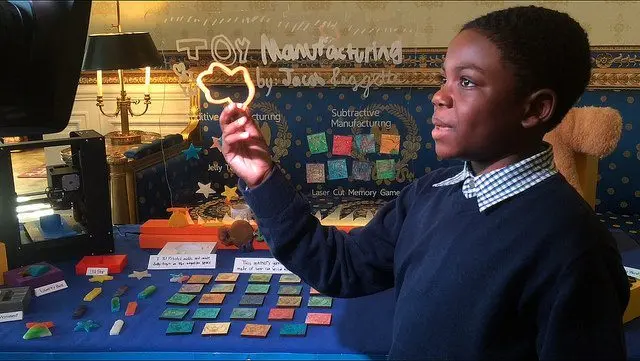Bringing up the next generation of entrepreneurs
11/29/2016| Maureen Kilcullen
Bringing up the next generation of entrepreneurs
11/29/2016 | Maureen Kilcullen
Nine-year-old Jacob Leggette had a dreamand a problem. After learning to 3D print in Digital Harbor Foundation's two-week Mini Makers course, he was inspired to create even more items but didn't have a 3D printer of his own. He decided to write to manufacturers of 3D printers and ask for a donation. His hook? He'd provide feedback on how easy or difficult it was for a youngster to operate the printer. His pitch was successful.
With the help of DHF's after-school Mini Maker courses, with the support of his parents, and with his own ingenuity and drive, Jacob used his new 3D printer to prototype an entire line of toys and miniatures. He presented his projects – including a model of the White House – at the White House Science Fair in April. When President Barack Obama stopped by to visit with Jacob and try out a bubble wand he'd created, Jacob pitched the idea of a Kid Science Advisor in the White House. His idea came to fruition when the president created the White House Kids Science Advisory, which held its first meeting in October.
Jacob is just one of hundreds of Baltimore-area boys and girls whom Digital Harbor Foundation is inspiring to do great things. Programs, field trips, and events are designed to trigger students' interest in science and technology. Year-round Mini-Maker programs are geared toward students in grades three through five. Boys and girls in grades six through 10 may participate in 14-week Maker Foundations – a tech discovery program – and advanced courses are available for those students who complete Maker Foundations. All programs and services are offered on a "pay-what-you-can" basis.
This year alone, more than 700 youngsters from 90 different schools participated in DHF's after-school programs, where they discovered the latest technologies – things like coding, web design, 3D printing, digital manufacturing, and game design – and learned how to become entrepreneurs. DHF's programs have spurred an array of ideas and projects. One such project, 3D-printed reef balls that were created by students competing in Digital Harbor Foundation's FabSLAM competition in April, is helping to increase the oyster population in the Chesapeake Bay.
Digital Harbor Foundation is just one of the many Maryland nonprofit organizations taking part in Giving Tuesday, November 29. To support DHF – or to explore other options to contribute or volunteer – visit Giving Tuesday. A donation of time or money just might inspire another student and send him or her to the White House!
Keep up with the latest.
Sign up for e-mail notifications.
